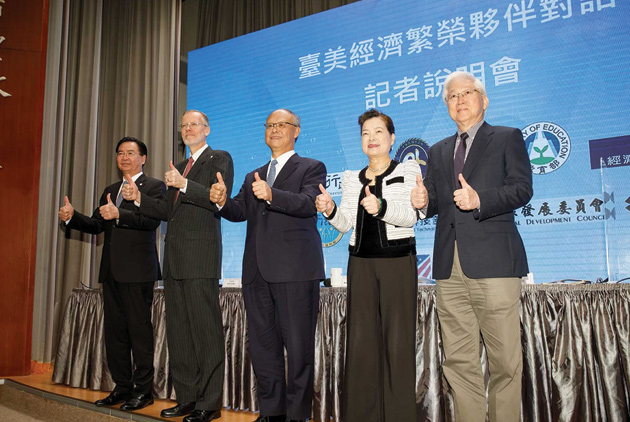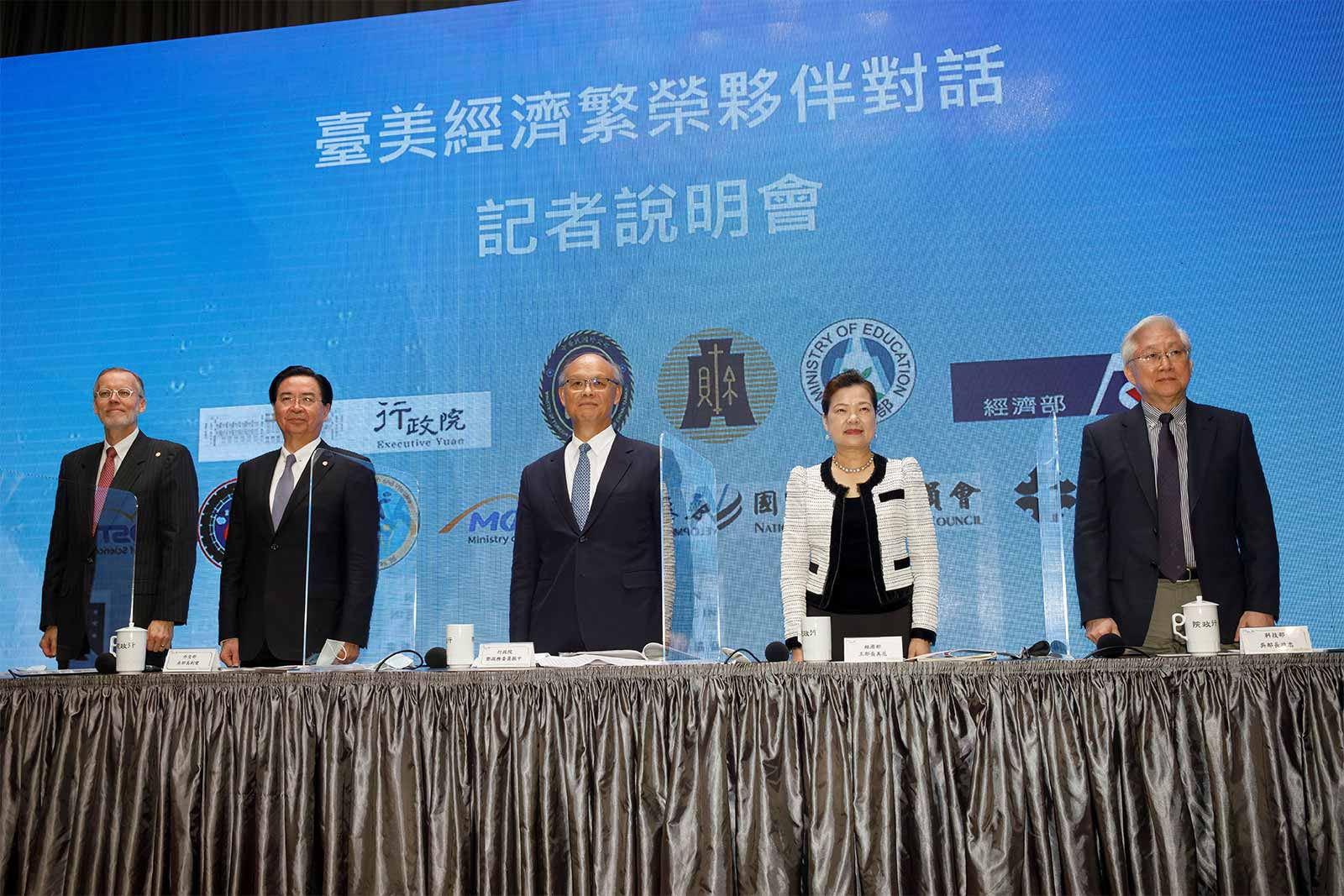Will the US-Taiwan Dialogue Continue in the Biden Era?

Source:Chien-Ying Chiu
Despite only having two months left in office, the Trump administration is still working hard to promote relations with Taiwan. One example of this is the signing of a Memorandum of Understanding during the inaugural meeting of the U.S.-Taiwan Economic Prosperity Partnership Dialogue. Is the way being paved for future trade deals between the two countries, or even a visit from the U.S. Secretary of State to Taiwan?
Views
Will the US-Taiwan Dialogue Continue in the Biden Era?
By Linden Chenweb only
On the morning of November 20th, the press conference for the inaugural meeting of the U.S.-Taiwan Economic Prosperity Partnership Dialogue was held at the Executive Yuan. The conference, which was scheduled for ten o’clock sharp, wound up starting more than ten minutes late.
Minister without Portfolio and top trade negotiator for the Cabinet John Deng (鄧振中), Minister of Foreign Affairs Joseph Wu (吳釗燮), Minister of Economic Affairs Wang Mei-hua (王美花), Minister of Science and Technology Wu Tsung-tsong (吳正忠), and American Institute in Taiwan (AIT) Director Brent Christensen filed in one after another. It was an interesting sight to behold.
Christensen would have taken center stage, but he was reminded by Joseph Wu that his place was on the far left. Even the AIT emblem was deliberately placed at the bottom, below the emblems of the National Development Council (NDC) and the Taiwan External Trade Development Council (TAITRA).
It was clearly an effort to keep the event low-key, but it had the opposite effect. On the eve of the transfer of power in the United States, the Taiwanese government was clearly feeling iffy about commitment. They responded passively, even resignedly, to the invitation to the Partnership Dialogue.

“It’s not your choice that this is the time the talks are held,” former AIT Director Douglas Paal said, “it should be held with the next administration”.
Paving the Road to a US-Taiwan Trade Deal?
The key purpose of the U.S.-Taiwan Economic Prosperity Partnership Dialogue was to ascertain that Taiwan and the United States shared the same strategic goals regarding 5G telecommunications safety, semiconductors, and the global supply chain. The two sides are erecting a Great Wall of Technology around China.
Joseph Wu stresses, “This is an important milestone in U.S.-Taiwan relations.” The dialogue is to become an annual event between the two governments, regardless of which political party is in power. The Memorandum of Understanding (MoU) that was signed is a five-year agreement, to be extended indefinitely so long as both sides agree.
“It has no obligation [to follow the MoU], but has an obligation to take it seriously,” Paal said, adding that the Biden administration is coming in with a very positive view toward good relations with Taiwan, underscored by a very broad consensus in Congress and the population to have good relations with Taiwan.
Democratic Progressive Party Legislator Mark Ho (何志偉) is optimistic about all this. He feels that once the Biden administration takes charge of the Economic Prosperity Partnership Dialogue, it will set the stage for a bilateral trade agreement (BTA) between the two countries.
The U.S.-Taiwan Economic Prosperity Partnership Dialogue comes under the purview of the U.S. State Department, while Trade and Investment Framework Agreements (TIFAs) are helmed by the Office of the United States Trade Representative. “These two tracks run parallel to one another. The TIFA is the way to go, because it will directly help Taiwan sign a BTA with the U.S.,” says Da-jung Li (李大中), Associate Professor at the Graduate Institute of International Affairs and Strategic Studies, Tamkang University.
Even though the U.S.-Taiwan Economic Prosperity Partnership is supported by the MoU, and even though it is a step toward a BTA, Professor Yeh-Chung Lu (盧業中) of the Department of Diplomacy at National Chengchi University expresses doubts. The DPP has always positioned itself as a stalwart protector of labor rights, so it is more reserved about signing trade agreements. This may put a damper on the Biden administration signing a BTA with Taiwan.
Paal says the Tsai administration has spent the last four years opening up Taiwan to importing American pork and beef. This is an important step toward the two countries signing a BTA. “I think a successful Biden administration could persuade democrats and others to support a free trade agenda,” he added.
Still, why would the Trump administration, with only two months left in office, sign an MoU strengthening ties with Taiwan? Paal observed that, since Biden won, the Trump administration has been trying to leave a legacy. For example, the announcement that Trump is pulling troops out of Afghanistan and Iraq, and also Pompeo visiting the Middle East and Europe.
In other words, in the eyes of Trump supporters, “having Taiwan’s back” has been equated with resisting China. Ambitious members of the GOP are eager to adopt this position. Not only is Trump contemplating running again in 2024, there is rumor in the White House’s diplomatic circles that State Secretary Mike Pompeo is also eyeing the Oval Office.
A Visit to Taiwan from the Secretary of State?
A political observer who declined to be named points out that when Taiwanese diplomats got into a fistfight with their Chinese counterparts in Fiji, Pompeo was one of the first to voice his support for Taiwan.
In early November, he announced the U.S.-Taiwan Economic Prosperity Partnership on Twitter. “He’s eager to be the first among those who are ‘tough on China’. Whether he runs for president, the Senate, or just starts his own think tank, this is a good way for him to network and get funding.”
There is also rumor that, thanks to the prodding of academics from conservative think tanks, Pompeo is contemplating visiting Taiwan before leaving office to further cement his image as a hardliner against China.
Paal notes that, although U.S. officials who have visited Taiwan during the four years of the Trump administration were higher-ranked than ever before, and although this has led to Chinese aggression and repeated military drills, the visiting officials were mostly limited to representing America’s economic, healthcare, or environmental interests. In other words, they were still toeing Beijing’s line. “If the Secretary of State really visits Taiwan, it would definitely provoke a response from Beijing.”
This goes to show that, even if Taiwan benefits from the tech war between China and the U.S., and even if Taiwan has the chance to become an important tech ally of the U.S. based on the Economic Prosperity Partnership, we should always keep the possible political ramifications in mind, and not let ourselves be backed into a diplomatic corner.
Have you read?
♦ The Power of Taiwan’s Silicon Shield: Will It Hold in Biden Era?
♦ Richard Bush: Biden's Taiwan Policy would be More Predictable
♦ SEMI: The U.S. should work with China as a competitor, not an enemy
Translated by Jack Chou
Edited by TC Lin
Uploaded by Penny Chiang






